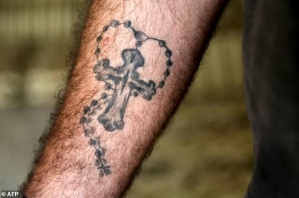Dozens of Syriac-Assyrian Christians have united to fight ISIS militants in Raqqa, Syria, driven by a desire to protect their homeland and rid the region of Islamic extremism for the first time in three years.
"I'm sacrificing for what they did to our people, our sects, for the churches they blew up. For all these things," Aleksan Chmou, a Syriac fighter, told the AFP.
"Our Messiah Jesus Christ has a saying: if anyone slaps you on your right cheek, turn your left cheek to him," the 28-year-old added. "But for me, if someone slaps me on my right cheek, I'm going to put a bullet in his head."
Islamic State, also known as IS, ISIS, ISIL or Daesh, has been operating from Raqqa, one of its two major strongholds, since 2014. However, the terrorist group is now losing ground as the U.S.-backed Syrian Democratic Forces (SDF) close in on the city. IS could be defeated within months, officials have said, as forces on Thursday cut off militants' last remaining escape route.
While the ground assault is being carried out by the SDF, a majority Kurdish and Arab alliance, dozens of Christians from the Syriac sect have also joined the fight. Many of them have tattoos of rosaries inked around their wrists and the word "JESUS" printed down their forearms.
"In some neighborhoods, we are on the front lines of the fight," 23-year-old Fadi, a Christian, told the outlet. "We received military training and put on this uniform to fight Daesh, liberate our people and all the peoples of this region," he said.

Thousands of Syriac Christians once lived in Raqqa alongside Armenians, Kurds and the city's mainly Sunni Arab population, but many fled when IS overran the city. After the group declared an "Islamic caliphate" in the Raqqa it said Christians could remain - if they paid a special tax or converted to Islam. Instead of complying, many fled.
An investigative report on displacement and emigration of Christians in Syria and Iraq recently estimated that at least 50 percent and up to 80 percent of the Christians have fled the two countries since the start of the Syrian civil war in 2011.
Abboud Seryan, also Christian, told AFP, "We're participating in the liberation of Raqa in the name of all Syrians. There's no difference between Syriacs, Kurds, or Arabs. We're all brothers."
The jihadists "blew up Raqqa's churches and forced Christians to convert to Islam. This is also why we're participating in this battle," he said.
While thousands of ISIS fighters are believed to have fled Raqqa into the group's territory to the south, remaining members of the terrorist group have increased its use of suicide bombers and roadblocks in the city. On Saturday, two IS car bombs targeted SDF headquarters in the Jazara and AL-Idkhar districts, according to the terror outfit's self-described news agency, Amaq.
Johannes de Jong, who works closely with Syriac-Assyrian Christians involved in the campaign to defeat ISIS, told Premier News Hour the fighters are desperate for the support and prayers of the international Christian community.
"The very clear picture they're giving me is that there's a wall around Raqqa, they put it full of mines," he said. "You have to imagine a situation where they have to fight for every street and every house. It will be bad. There are still a lot of civilians they [ISIS] will use as human shields. They still have high end military equipment they stole in their past from places like Mosul. It will be tough".
He added that prayers for the Christian fighters should be focused on strength and resources.
"Pray that as many as possible will make it through and this fight will not be too long," he said. "Pray that there will be guns and ammunition for Syriac-Assyrian Christians while part of this fight to liberate Raqqa. Your prayer shouldn't be lofty, but we should pray to Jesus for the daily bread."
Meanwhile, the Raqqa Civilian Council, established by the SDF, last week pardoned 83 captured ISIS fighters, in what it said was a goodwill gesture designed to promote stability.
The council, which is expected to rule Raqqa once ISIS is eliminated in Raqqa, said the pardoned fighters "were low-ranking members and were not involved with violence." All were transported to the headquarters of the Raqqa City Council in the village of Ain Issa, north of Raqqa.
The youngest of the prisoners pardoned was 14 years old, according to Reuters.






